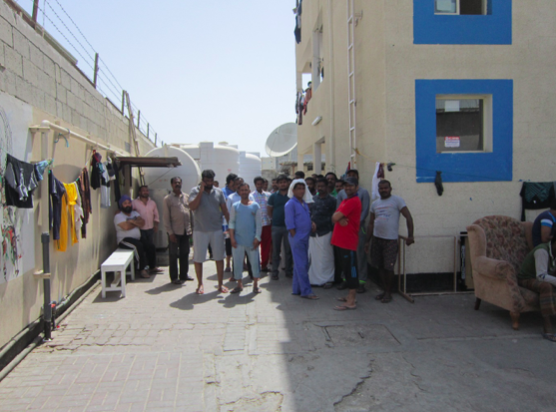Over the past decade, there has been a rise in suicides in Bahrain, primarily among migrant workers. The rise in suicides is a testament to the abysmal conditions that these workers endure. Physical abuse, forced labor, debt bondage, poor living conditions, and isolation are among some of the reasons many expat workers feel the need to take their own lives. While the government has no direct relation in the rise of expat worker suicides, their lack of cooperation along with the lack of cooperation from companies involved – despite the many protests that have taken place in order to gain recognition to help migrant workers – has not been a positive factor.
According to a study from the Bahrain Medical Bulletin in September of 2013, the “prevalence of stress was higher among those who worked for more than eight hours daily. People earning less than 100 BD (265 USD) a month had the highest prevalence of stress.” In addition, “workers in debt showed high prevalence of stress.” Often times this stress can cause great emotional strain on these migrant workers, especially since many of them lack emotional support. Furthermore, the study found that “those working more than eight hours a day were more anxious.” Many of the expatriates earning less than BD 100 (265 USD) a month and participants in debt reported a “higher prevalence of anxiety.” The study concludes by mentioning “the strongest predictor of depression was outstanding loan,” assessing that the main component of the worry and anxiety of expat workers is financial issues.
The US Department of State’s 2018 Trafficking In Persons (TIP) Report moved Bahrain from Tier 2 to Tier 1 status, indicating that the government “fully meets the minimum standards for the elimination of trafficking,” overlooking the human rights abuses going on and the rise in suicides among migrant workers due to the harsh conditions, ill treatment, and financial instability. However, in the 2014 TIP Report, there is mention of how “forced labor, debt bondage, and isolation have led to a high incidence of suicide among migrant workers in Bahrain.” The 2014 report noted that workers who committed suicide reportedly had lost their jobs or had their salaries and passports withheld by employers and sponsors. Despite the US Department of State moving Bahrain from Tier 2 to Tier 1 status, the Bahraini government continues to fail to prosecute or convict any forced labor offenders and frequently treated potential cases of forced labor as labor violations instead of treating them as serious crimes.
In addition to the financial difficulties, loneliness, and workload, miserable living conditions makes the plight of migrant workers all the more difficult. In Bahrain, more than 100 workers residing in labor camps have either resigned because of unpaid wages, or have been fired by their company. Many of them now live in Bahrain with irregular status because their companies failed to renew their visas. With expired cards and visas, workers fear being detained by the police and are worried to leave to find another job or even go to the clinic. Furthermore, their struggle is made all the more miserable when safe and proper accommodations and lack of food provisions are yet another issue these workers must face. Many reports have been made about the abysmal living conditions in labor camps, some stating that up to 12 people will be confined to a single over crowded room (despite a Bahrain law stipulating a maximum of eight people per room). Additionally, some camps have no working toilets or running water in the showers – forcing many of the workers to use water buckets to clean themselves.
While there has been nominal involvement on behalf of the Bahraini government, reform concerning migrant rights is desperately needed. Because there is no minimum wage established, labor conditions remain poor for many of the migrant workers in Bahrain due to there being no laws in place that guarantee their protection. The rise in suicides of poor laborers and other workers can be traced to financial difficulty. Some Bahraini doctors are concerned that more suicides are inevitable if people’s living conditions do not improve.
Despite the efforts of many activists and rights organizations, the government must show concern in order to create lasting change. Ultimately, it is crucial that authorities work to eliminate migrant rights violations and hold perpetrators accountable. While the exact reason each migrant worker takes their life may be unknown, the ever-pressing pattern of financial difficulties, depression, and dreadful living conditions are prevalent factors.
Celia Pena-Gomez is an Advocacy Intern with ADHRB.





